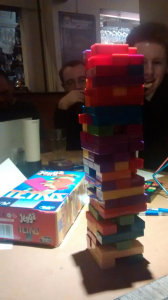Manchester’s first MathsJam of 2015 (and indeed, all the other first MathsJams of 2015 in cities all over the world) met on 20th January, rousing us all from a Christmas-induced slumber and gently easing us back into a year of recreational maths. Here’s a round-up of what we did.
We started off with a nice logic puzzle to warm up, which we gave to everyone to see who could get an answer the quickest:
MAN: We think Eric did it. pic.twitter.com/ki8Gf2p03U
— Maths Jam (@MathsJam) January 20, 2015
Lots of toys and games were present this month – we built a truncated icosahedral structure using the tiny magnetic balls (so dangerous they’re banned in three-ish countries), and played with some Japanese box opening puzzles, which someone had found in a second-hand shop.
 Then we instigated a large game of Tetris Jenga, while discussing the shortcomings of the Tetris/Jenga crossover format (not all the pieces have four squares to them, not all Tetris pieces are represented, it’s really difficult to play) and despite all this we managed to keep the game going for a good while.
Then we instigated a large game of Tetris Jenga, while discussing the shortcomings of the Tetris/Jenga crossover format (not all the pieces have four squares to them, not all Tetris pieces are represented, it’s really difficult to play) and despite all this we managed to keep the game going for a good while.
At this point, for complicated logistical reasons, we moved tables, after which the group split across two tables and various games were played. On one table, a game of No Thanks!, with its interesting game theoretic strategy – you have to try to collect the optimal hand, and each card can be directly picked up or offered round the table, which is often worth doing, as it results in winning more tokens (I didn’t play – I only had it explained to me – but I’d like to next time!). On the other table, a game of MathsJam staple SET took place, followed by what’s quickly becoming a staple – 6 Nimmt!, a German card game involving placing your cards without overfilling a stack, in which case you have to take the whole stack.
We also tried out someone’s new Christmas present – a dice game called Farkel. While it can be played using a regular set of dice, the Farkel dice that came with instructions had a different symbol (‘Farkel’, or ⌘) in place of the number 5 (but were otherwise just normal dice). This resulted in a group decision to replace the word ‘five’ with the word ‘farkel’ in conversation, and hilarity ensued (especially for the person scoring the game, who had to often say things like ‘you have farkel hundred and farkelty points’, written ⌘⌘0). We’re such wags.
The game involves trying to roll certain combinations to score points, and on each roll you choose which of your dice you want to score, and have the option of re-rolling the rest – although if none of them score anything, you lose all the points you’ve earned so far that turn. The game’s initial barrier of needing to score at least 500 points (⌘00 points) to be ‘in’, much like the mechanic in Rummikub, meant that it took us a while for all 7 players to be scoring points. Mostly, we just complained that all the scores were multiples of 10 (indeed, multiples of farkelty) so we could have divided the whole thing through, and instead of trying to score 10,000 points to finish, we’d only need 200, which would… be quicker?
We also had a crack at some of the puzzles posed by other MathsJams on Twitter, including a square-based teaser from Leeds – but it was mostly good to see everyone, and to have such a good turnout (with a few new faces too!). We’re all looking forward to February 201⌘!